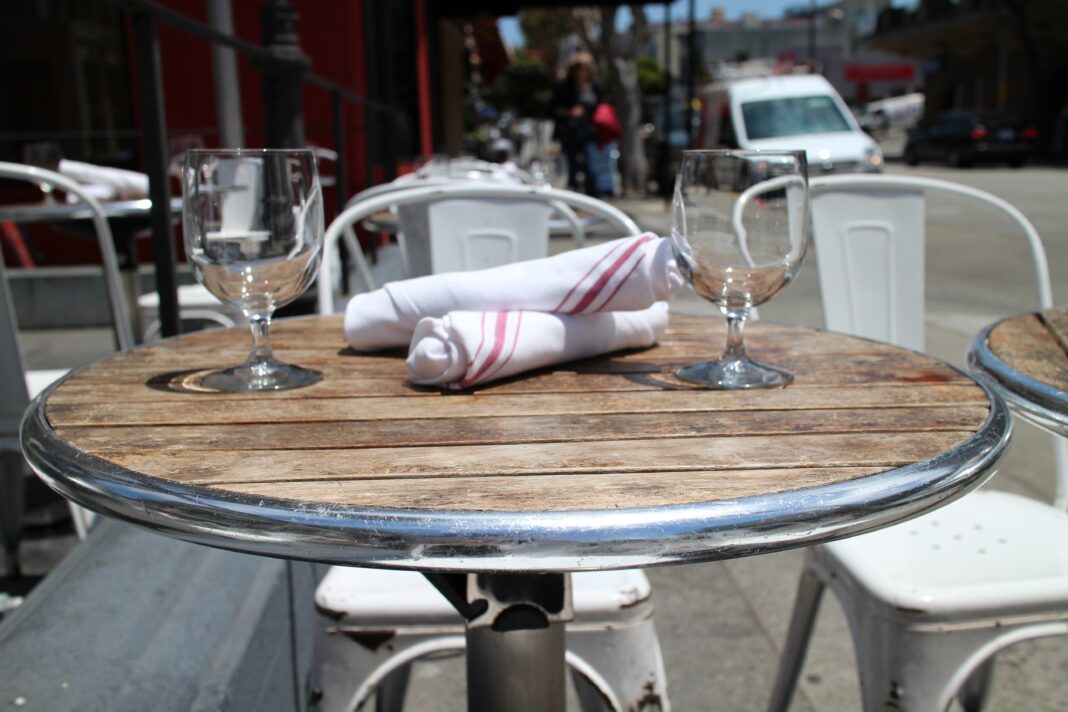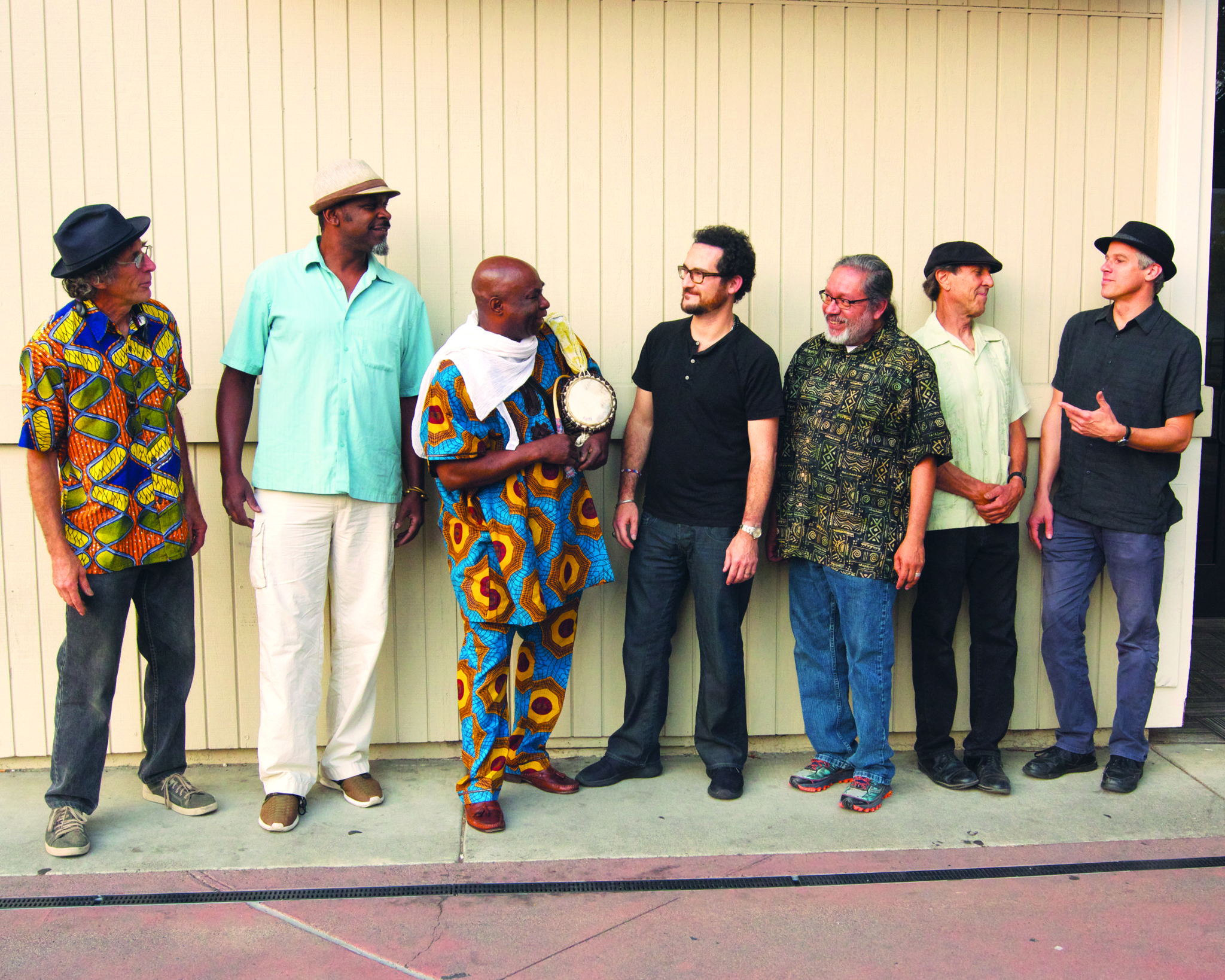Businesses have struggled mightily to stay afloat during the Covid-19 pandemic, and as the fourth wave of the virus impacts Marin, they’re not out of the woods yet.
Cities around the county implemented temporary downtown street closures and parklets to help drive foot traffic to retailers and restaurants. Now, some Marin cities are making these measures long-term—and not all businesses are onboard.
A street closure involves placing barricades to prevent vehicles from entering an area, opening the streets to pedestrians. Parklets convert vehicle parking spaces into seating, usually intended for a restaurant to expand their dining capacity outdoors.
While the public generally finds it appealing to mill about or dine on a closed street without concern for vehicular traffic, some retailers aren’t convinced the concept benefits their businesses. Shop owners are hesitant about displaying their merchandise outside, and don’t make use of the sidewalk or parklet space. Customers complain to retailers about the lack of nearby parking, and having to carry packages several blocks to their cars.
Conversely, restaurants and bars increase their footprint, adding tables and chairs on the sidewalks, parking spaces and streets, which allows customers concerned about Covid to dine al fresco. Some restaurants have invested a substantial amount of money in semi-permanent parklets, creating a comfortable atmosphere with decorative dividers, plants, heaters and soft lighting.
Novato, San Rafael, San Anselmo, Fairfax, Mill Valley, Tiburon and Sausalito are among the Marin cities that experimented during the pandemic by closing streets and/or designating parking places for parklets. Whether or not the programs were a success depends on who one asks.
In Novato, the program has run in fits and starts since it began last year. From June to November, two blocks of Grant Avenue, from Reichert to Machin, were shut down every weekend, from Friday at 1pm through Sunday evening. The program stopped during the winter months, resumed in March and then was abruptly suspended in April due to feedback from the downtown business community.
Still, the City Council voted unanimously last month to adopt the “Living Streets” program, which closes the same two blocks of Grant Avenue, although an adjustment was made on the closure times. Rather than remaining closed for the entire weekend, the street will shut down on Friday, Saturday and Sunday evenings, from 5pm to midnight. Swinging iron gates will soon be installed in three locations to keep vehicles out during the designated hours.
However, some Novato retailers aren’t pleased with the plan and the way Novato handled the decision-making process, even claiming city staff was not forthright when discussing the results of a survey of downtown businesses and assessing public demand about the closure.
The city sent a survey to approximately 300 downtown Novato businesses in September to gauge their interest in continuing the street closures. Fifty businesses completed the survey, with two of those responding that they had already shuttered their doors permanently. Some owners complained they never received the survey.
Documents released in response to a public records request reveal that one of the survey questions asked whether the business would be interested in a seasonal or permanent closure of Grant Avenue, given that the community had expressed interest in the idea. Of the 48 respondents, 46% said “yes,” 26% replied “no” and 28% answered “maybe.”
In November, the city presented the survey results at a Downtown Novato Business Association meeting. For the question regarding the interest in the street closure, the “yes” and “maybe” responses were combined for a total of 74%.
In future references, the “maybe” was dropped from discussions and the 74% statistic was used as the percentage of respondents who replied positively, even though the actual figure was 46%.
“The City reminded everyone there had been an extensive survey done in the fall, where 74% of the respondents indicated they were in favor of the street closure. At that time, it had been in place for five months,” according to the DNBA meeting minutes from March 2021. Two city staff members were present at the meeting.
While the city declared in the September survey that the community expressed interest in the downtown street closures, it appears no letters of support were received by the city until the following February, when five emails arrived. In June, when Finnegan’s Marin, a downtown Novato restaurant and bar, requested on social media that patrons send favorable emails to the city—an additional 38 emails were received.
Dan Maher, owner of Sustainable Exchange, a retail store in the downtown Novato closure area, has been a vocal opponent of the program, claiming his business suffered financially.
“The expressed character of the support for these [street closure] events is fraudulent or not supported with evidence,” Maher said.
Beauty Heroes, another shop in the closed portion of Grant Avenue, stays open until 6pm on Friday and Saturday. Owner Jeannie Jarnot has expressed concern about the 5pm start time for the program.
“I think it trains customers to stay away during that time,” Jarnot said. “We provide beauty services in our store, and the street closure adds a level of complexity with people needing to move their cars. It doesn’t benefit everyone.”
Other Novato businesses express enthusiasm for Living Streets. Village Child, one of the largest retailers in the closure area, plans on staying open later during the weekends, in order to take advantage of the foot traffic.
“I have nothing but positive things to say about the program,” Village Child owner Emily Rich said. “I think that the street closures are a very easy scapegoat for why some people’s businesses aren’t doing well.”
Henry Hautau, owner of Finnegan’s Marin, believes the city came up with a satisfactory compromise by limiting the closures to weekend evenings. Restaurants and bars were pushing for a 4pm street shutdown because of the amount of time necessary to move tables and seating outdoors.
Novato isn’t the only city trying to meet the needs of all downtown businesses. The Mill Valley City Council considered rescinding its ordinance allowing outdoor dining in parklets and the Downtown Plaza, but after an outcry from restaurants, it voted unanimously on Monday to extend the program through June 2022.
San Rafael approved its parklets through November 2022. Its Dining Under the Lights program closes a considerable length of 4th Street, from Lincoln Avenue to the West End, on Thursday and Friday nights, from 5–9pm, through September or October.
“There’s general concern about the delicate balance of parking and street closures,” Danielle O’Leary, City of San Rafael economic development director, said. “There are people who feel passionate on all sides of the issue.”









